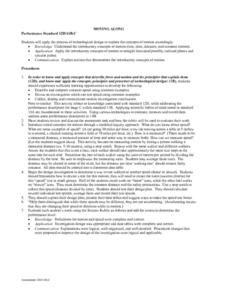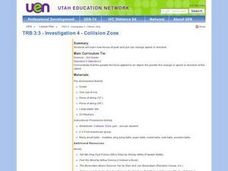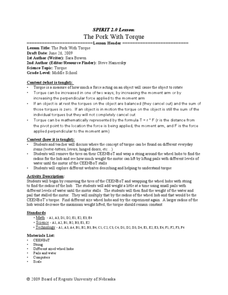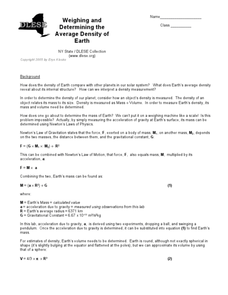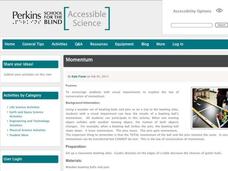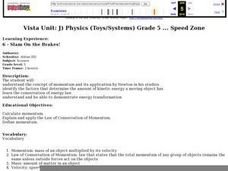Curated OER
Moving Along
Young scholars are introduced to the concept of motion. In groups, they practice calculating the rate, time, and distance of various objects on a variety of surfaces. To end the lesson, they apply the same principles to those objects...
Curated OER
MEASURING THE GRAVITATIONAL CONSTANT, G
Students study gravitational force an. In this gravitational force lesson students observe a demonstration.
Curated OER
Investigation 4 - Collision Zone
Third graders study how forces of push and pull can change speed or direction.
Curated OER
Gravitational Factors
Students identify the forces that affect the weight of an object. In groups, they determine the proper math model which can demonstrate the attraction between two objects based on gravity. They discuss the relationship between the weight...
Curated OER
The Pork With Torque
Learners determine the torque of CEENBoTs wheel hub. In this physics lesson, students reinforce their learning by exploring interactive websites on torque. They give real life applications of torque.
Curated OER
What Structural Challenges Do Bridge Builders Face Today?
Students investigate the process of constructing a bridge. They study the meaning of structural force and draw pictures of examples. Students identify the types of building materials have been used in history to construct bridges and how...
Curated OER
Action-Reaction! Rocket
Students construct a rocket from a balloon propelled along a guide string. They use this model to learn about Newton's three laws of motion, examining the effect of different forces on the motion of the rocket. They measure the distance...
Physics Classroom
Action-Reaction Lab
Computer-interfaced motion detectors are required to carry out this inquiry. It is a new twist on exploring motion with plunger carts: they are set back-to-back and then propelled away from each other. Their velocities are measured, and...
Curated OER
Exploring Buoyancy
Students use materials found at a resource table to design simple devices that will house instruments to take water samples from a tub of water. They design 3 instruments, each varying in density so that one will float, one will hover...
Curated OER
Dance: Water Dancing
Examine the way water moves, drips, and splashes with an expressive dance. Learners discuss the ways in which water moves, then create dance sequences that show or describe water. There are several suggestions to adapt this lesson to...
Curated OER
Paper Suspension Bridges: You Want Me To Go Up There?
A few class periods will be required to complete this physics investigation with your high schoolers. There is an unavailable video written into the lesson plan, but there is plenty of material here to bridge the gap. Two terrific...
PHET
Earth’s Magnetic Field from Space
Feel the pull of science! The final installment of this 18-part series is an application of everything learned in the previous high school lessons. Scholars are given a magnetic field map and must propose an arrangement of magnets that...
Curated OER
Build A Borneo Glider!
Students construct a paper glider. In this physics of gliding instructional activity, students first learn about Borneo and it's rainforest habitat. After students discover the way animals in Borneo glide from tree to tree, they use...
Curated OER
Weighing and Determining the Average Density of the Earth
Some background information about density and Newton's Laws of gravitation and motion assist pupils in the following experiment. The procedure will help them further their understanding of gravity, pendulums, and a drop-ball experiment....
Perkins School for the Blind
Momentum
The laws of momentum can lead to fun! Learners with visual impairments use bowling pins and a bowling ball to model the law of conservation of momentum. They take turns bowling with differing degrees of force to explore how energy is...
New Mexico State University
Lab 6: Kepler's Laws
A 15-page package thoroughly teaches your physics or astronomy learners about Kepler's three laws of planetary motion. Each one is stated and explained. Class members answer questions, solve problems, and participate in the classic...
EngageNY
Why Are Vectors Useful? 1
How do vectors help make problem solving more efficient? Math scholars use vectors to represent different phenomenon and calculate resultant vectors to answer questions. Problems vary from modeling airplane motion to the path of a...
DiscoverE
Pilot a Balloon
Balloons will go where you want them to. Young pilots first add paper clips to a balloon to make it neutrally buoyant. They then use cardboard to steer the balloon in different directions, taking air pressure into account.
Curated OER
The Physics of Sports: An 8th Grade Physical Science Project
Explore the relationship between sports and physics in a cross-curricular lesson. Middle and high schoolers prepare a multimedia presentation based on a chosen sport. They answer five physics vocabulary questions about how the laws of...
PHET
Science and Engineering Conference
Young scientists present their experimental designs from the previous experiment. The ninth lesson in the series outlines what learners should present, what class discussions should happen, and the solution NASA came up with for the same...
University of Colorado
Happy Landings: A Splash or a Splat?
Huygens spacecraft landed on Saturn's moon Titan in 2005, making it the farthest landing from Earth ever made by a spacecraft. In this hands-on activity, the 12th installment of 22, groups explore how density affects speed. To do this,...
PHET
Learning about Space Weather
Is the sun the only celestial body with magnetic fields? A guided discussion on the weather in space is designed with a mix of questions, discussions, explanations, and applications. Additionally, the resouce includes an...
Curated OER
Slam On the Brakes!
Fifth graders study the concept of momentum and its application by Newton in his studies. They view a demonstration and complete an experiment with toy cars on a racetrack that shows them the properties of momentum and how velocity and...
University of Colorado
Terra Bagga
Earth's magnetic poles switch positions about every 200,000—300,000 years. In the activity, groups create a planet with a magnetic field. Once made, they use a magnetometer to determine the orientation of the planet's magnetic field....
